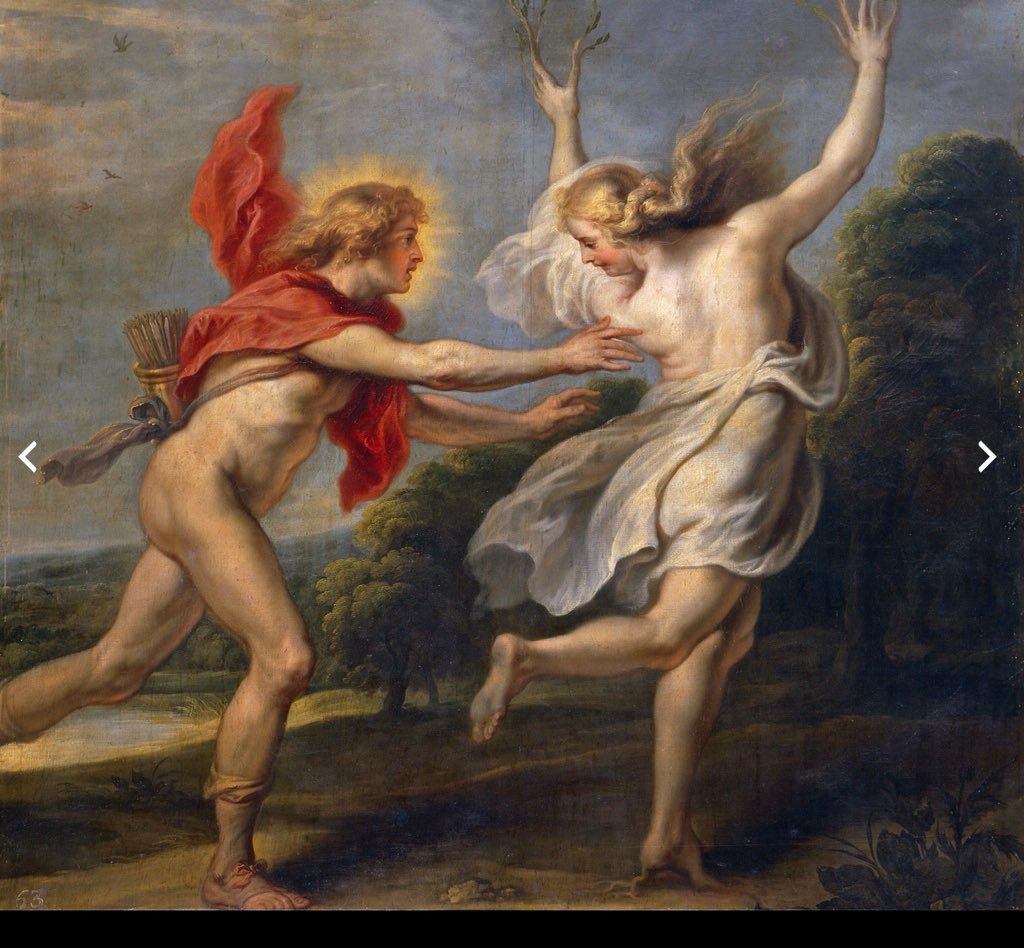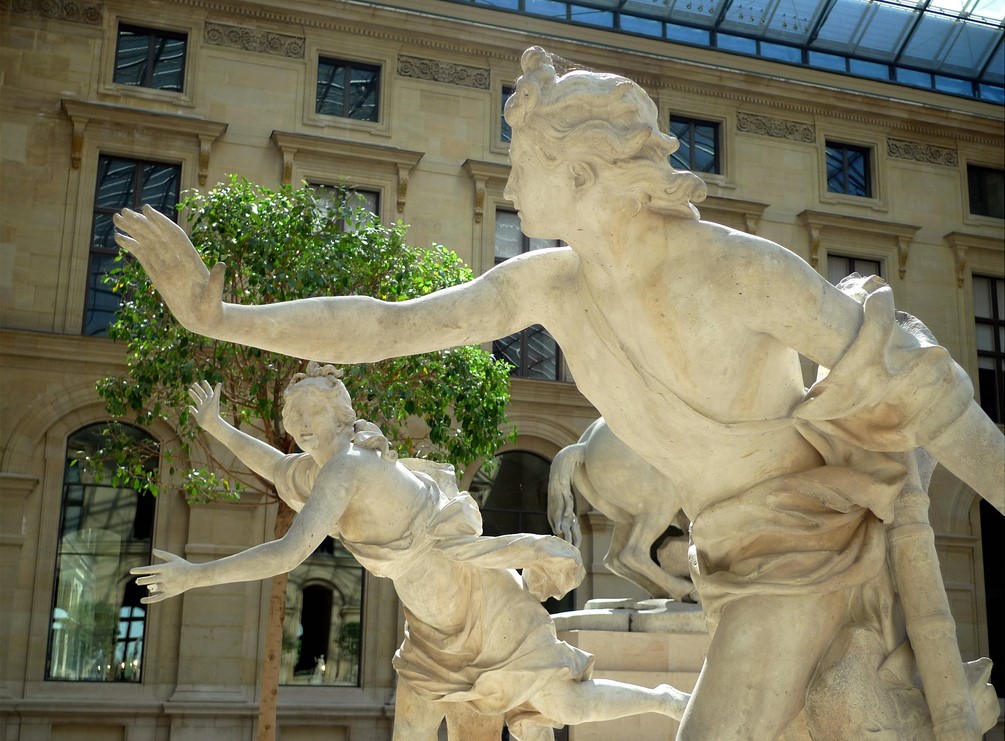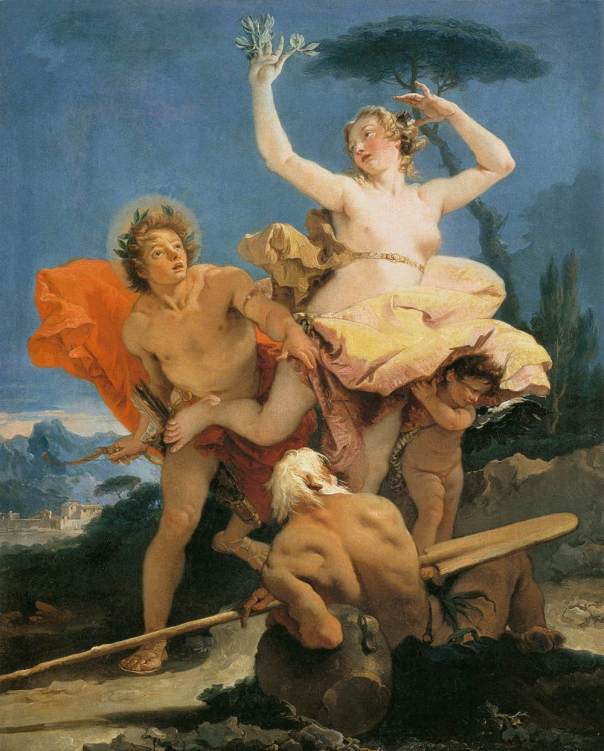Daphne
The nymph who escaped from the god Apollo by transforming into a tree..

Daphne was a nymph loved by Apollo. Apollo chased her into the forest, but when he was about to catch her, Daphne was transformed into a laurel tree. In our times a laurel wreath is a symbol of success and follows the tradition that began in ancient Greece when the winners in a competition or music contest were awarded with laurel wreaths in races in honor of Apollo
Nymph Daphne was the daughter of a river god, either Ladon of Arkadia or Pinios in Thessaly, and according to all references she was exceptionally beautiful. There are two stories starring Daphne, in both of which Apollo was deeply in love with her. Although the love of the god of music did not find a response, the ancient Greeks believed that Apollo was forever identified with Daphne, making the laurel tree a symbol of his own.
The lesser-known story of the two, was propagated by the writer and geographer Pausanias. In this version of this myth, Leucippus, the son of King Oenomaus of Ilida, fell in love with Daphne from the first moment that he saw her in the forest near his father's kingdom, but knew that the nymph had vowed to remain untouched by a man. Wanting to stay close to her even though she could not response to his love, Leucippus disguised himself as a woman with long hair. He then met Daphne, told her she was one of Oenomaus’ daughters and wanted to go hunting along with Daphne and the other nymphs. Daphne agreed, so Leucippus proved to be an excellent hunter who won her respect.
After some time, however, Apollo, who knew Leucippus’ deception, was jealous and angry. He wanted Daphne for himself and prevented her from falling in love with someone else. One day during the hunt, Apollo set an idea in the minds of Daphne and the other nymphs to swim in the Ladon River. When the nymphs were got undressed, Leucippus refused to take off his clothes. The rest of the nymphs fell on him to undress, revealing that he was actually a man. Outraged, they attacked him and killed him with their spears and hunting knives.

Ο πιο διάσημος μύθος με την Δάφνη ήταν εκείνος που διηγήθηκε ο ποιητής Οβίδιος. Όταν ο Απόλλων καυχήθηκε ότι ήταν καλύτερος τοξοβόλος από τον Έρωτα, ο θεός της αγάπης του έριξε κρυφά ένα από τα βέλη του. Το βέλος του Έρωτα έκανε τον Απόλλωνα να ερωτευτεί τρελά την Δάφνη. Ο Έρωτας χτύπησε και την Δάφνη με ένα βέλος, αλλά το βέλος δεν ήταν μυτερό και η άκρη του ήταν από μόλυβδο, με αποτέλεσμα να κάνει την νύμφη να απορρίψει τον έρωτα όλων των ανδρών και να επιθυμεί να παραμείνει παρθένα.
The most famous legend with Daphne was the story of the poet Ovid. When Apollo boasted that he was a better archer than Eros, the god of love secretly cast one of his arrows. The arrow of Love made Apollo fall in love with Daphne. Eros hit Daphne with an arrow as well, but the arrow was blunt and its edge was made of lead, causing the nymph to reject the love of all men and to wish to remain virgin.

Apollo tried to approach Daphne, but she ran away from the god of light. Apollo chased her through the forest, running like the wind until the two of them reached the banks of the Pinios River. Apollo almost caught her when she prayed to her godly father for help. Immediately her legs were transformed into roots, her chest into tree trunk, her arms into branches and her long wavy hair into leaves. Daphne had been transformed into the laurel tree, which eventually took the name of the nymph in greek.
According to the poet Ovid, Apollo embraced the little tree and kissed the trunk at the point where Daphne's heart would be. He spoke to her for a last time, saying to her: "Since you can not become my bride, you will become my tree." From that moment laurel became sacred to Apollo and his followers.

Because of the myth of Daphne and Apollo, the god was often portrayed wearing a crown of bay leaves. Apollo's priestesses in Delphi and other sacred sites wore similar crowns. Delphic priestesses burned laurels and other leaves as part of the ritual in which they revealed the prophecies and oracles of Apollo.
Near the ancient city of Athens there was a grove of laurel trees. The grove was called the sanctuary of Daphne and was a sanctuary of Apollo. In 480 BC during the Persian Wars, when King Xerxes' troops invaded mainland Greece, Xerxes set up his golden tent in the temple of Daphne.

The Persian king chose the sanctuary on the one hand because of its symbolic significance, on the other hand because it gave him a panoramic view of the site that was estimated to host the final naval battle between the Persian fleet and the remains of the Greek navy in the Bay of Salamis . But what happened was that the Greek ships, under the leadership of Admiral Themistocles, encircled and destroyed the Persian fleet in one of the most famous naval battles of history..
In our time, on the site of the sanctuary of Daphne there is an orthodox monastery, the Daphne monastery.
